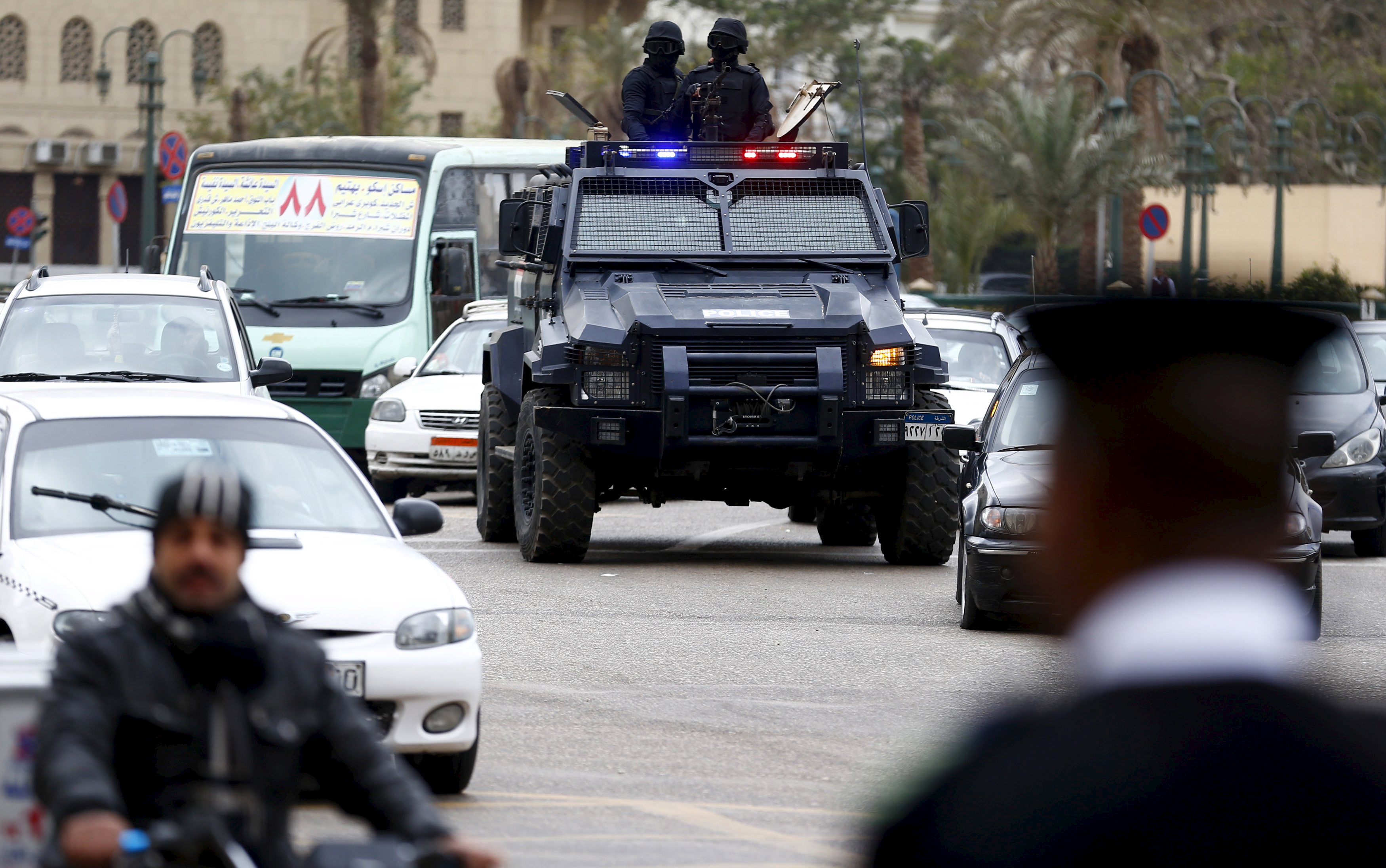Marginal protests, raids and police celebrations mark 5th anniversary of Egypt's Uprising

By Jihad Abaza
CAIRO Jan 25, (Aswat Masriya) - While for the most part, it is police forces who have taken to the streets of Cairo on the fifth anniversary of the 2011 Uprising, minor protests reportedly erupted in Sharqiya, Bani Suaif, Kafr el-Shiekh, and other provinces.
Small, brief protests also passed through Alexandria's and Cairo's alleyways.
Meanwhile, the Ministry of Interior said in a statement on Monday that it raided an apartment suspected to contain explosives in Kerdasa, and was caught in an "exchange of fire" with a man in the apartment, Mohamed Abdel Hamid, before shooting him. The state-owned al-Ahram Gate website also reported that two "terrorists" were killed in "an exchange of fire" in 6 October City.
Many opposition groups announced they will not take part in protests on Jan. 25, a date which marks the day mass protests calling for “bread, freedom, social justice,” and an end to police brutality began five years ago.
The April 6 Movement, which an Egyptian court banned in 2014, also announced they would not participate and said in an official statement: “Tahrir square, a symbol of the January revolution, is under military occupation on its anniversary.” The group called on people to dress in black on the day for commemoration.
The Anti-Coup alliance, which is made up mostly of the Muslim Brotherhood and other strands of Islamist parties, announced its call for a “revolutionary wave” earlier this month. In December 2013, an Egyptian court designated the Brotherhood a “terrorist group.”
Police announced “celebrations” on Monday 64th national police day. They roamed through Tahrir Square passing flowers and chocolates to their supporters.
Riham Ahmed, a human rights researcher at the Egyptian Commission for Rights and Freedoms, said that the general dulling down of street protests five years after a massive protest movement led former president Hosni Mubarak to step down is partially due to the risks that lie in the state’s tactics against political opposition and activism.
One protester who spoke to Aswat Masriya on condition of anonymity said that protest action in 6 of October city, on the outskirts of Giza, began at seven in the morning, and again at noon.
"Of course they end as soon as [we] get news that the Interior [Ministry] is on its way," she said. We protested "for all the rights that have been taken away as a result of this coup," she added.
She said that a lot of the protestors are women and older men. “Most of them have a husband, brother, or a son that is detained.”
The Egyptian Coordination for Rights and Freedoms documented 37 arrests in seven governorates on Monday.
Over the past few weeks ahead of the uprising’s anniversary, police forces raided 5,000 homes in downtown, Cairo. According to a report by the Association for Freedom of Thought and Expression, arbitrary arrests were concurrent in the days leading up to the anniversary of the uprising, while a number of activists were also informed they were banned from travel upon their arrival at the airport.
“The kind of risk people are facing right now has evolved over the past two years, especially after the massacres in Rabaa Al-Adawiya and Al-Nahda,” Ahmed said in reference to August 14, 2013, the day Egyptian security forces killed over 800 protesters in the public squares, according to Human Rights Watch counts.
The risks now lie in the "random strategies" of the state, she said. "Even if you are not politically active on the ground you cannot avoid the state repression because no one is safe under such escalating randomness." Such strategies include enforced disappearance, arbitrary detention, and the fabrication of cases, she added.
Earlier this month the el-Nadim centre for torture victims reported that it had documented over 700 cases of torture and ill-treatment in police stations and prisons, as well as over 400 people killed on the hands of security forces.
El-Nadim also reported 464 cases of “enforced disappearance,” which is defined in the International Convention for the Protection of All Persons from Enforced Disappearance as “the arrest, detention, abduction or any other form of deprivation of liberty by agents of the State or by persons or groups of persons acting with the authorisation, support or acquiescence of the State, followed by a refusal to acknowledge the deprivation of liberty or by concealment of the fate or whereabouts of the disappeared person, which place such a person outside the protection of the law."
A source from the ministry of interior ruled out that the number of violations cited in Nadim Centre's report. He also added that the state-affiliated National Council for Human Rights recently referred 191 complaints to the ministry, and the ministry responded to 118 of the cases.
The security source told Aswat Masriya that the ministry is looking into the complaints of torture cases, deaths in custody, and the enforced disappearances filed by human rights organisations. The source added however, that suspects' families are trying "to create chaos" on the anniversary of the uprising.
Ahmed maintains that resistance is still there, but it has changed "in its form and scale," again especially as the controversial protest law allows the state to legally detain anyone protesting on the street without official permission.
“For example, human rights organisations right now are one of the state's arch-enemies because they [reveal] the different forms of repression, that [the state] performs,” Ahmed said.
Local and international human rights watchdogs, such as Human Rights Watch, have repeatedly condemned Egyptian authorities for their harassment of human rights workers.
“Moreover, sarcasm became one of the major criticism tools people are using to resist the current regime. Therefore, the trend has shifted from going down on the streets chanting for certain demands and striking to alternative ways that are surprisingly causing panic attacks to the regime,” Ahmed told Aswat Masriya.









facebook comments